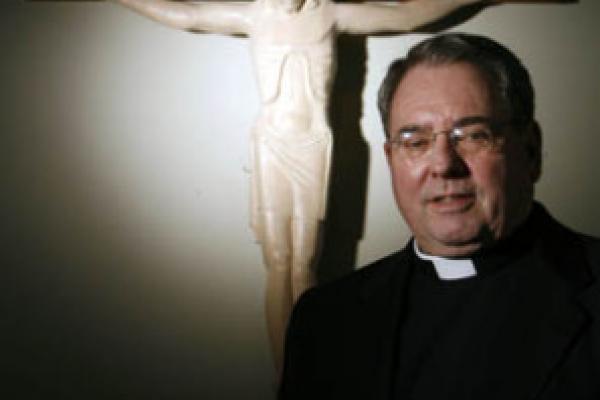The Rev. Frank Page, former president of the Southern Baptist Convention, was getting ready to work in the yard in the fall of 2009 when the phone rang. His daughter was on the line.
Daddy, I love you, she said. Tell Mama and the girls I love them, too.
Then she was gone.
Melissa Page Strange, 32, took her own life just after hanging up the phone with her dad.
“I do not want you to imagine what that is like,” he said.
For years, Page did not share the painful details of Melissa’s death, fearing that some Christians might speak ill of her if they knew. Mental illness and suicide were taboo topics for many churches, seen as a kind of spiritual failure.
But that may be starting to change.
Due to sequestration, programs that fight domestic violence and sexual assault will lose 20 million dollars in funding this year. Congress has voted to restore funding to tuition aid for service members and the Federal Aviation Administration but not the Violence Against Women Act. It is estimated 70,120 fewer domestic violence victims will have access to recovery programs and shelters and 35,900 fewer people will get help obtaining non-shelter services such as restraining orders and sexual assault treatment. Mother Jones reports:
"The tower is understaffed and the rescue plane can't land," says Kim Gandy, president and CEO National Network to End Domestic Violence. "We're talking about really vital services to people who are already in a terrible situation and really in need of emergency services—and there aren't alternatives."
Read more here.
The television flashes images of a skeletal little girl whose ribs seem to be popping out of her ballooning stomach as she sits in a pile of mud and stares at the camera with large pleading eyes. A “1-800” number flashes on the bottom of the screen. A celebrity does a Public Service Announcement for building wells in Africa. YouTube has sharp pre-packaged videos pulling at our heartstrings, and even months after being released, the KONY 2012 viral video continues to float around the internet.
For Westernized cultures saturated with various forms of media and technologically driven information, social justice is becoming increasingly "packaged," carefully marketed, and commercially manufactured to be a product that incorporates the mission it represents.
Whether social justice organizations should be doing this is debatable. Like everyone else, they’re trying to survive in a capitalistic system that ruthlessly competes for our every dollar. The only problem is that we aren’t the ultimate consumers. For social justice non-profit groups, the sick, poor, starving, abused, and desolate are the true consumers; we’re just the financial and volunteer base needed to keep the system working. To do this, organizations are discovering that a corporate business model is sometimes the only way to survive — and sometimes thrive — within the cutthroat world of advertising and solicitation.
NEWARK, N.J. — The Roman Catholic priest at the center of a public furor enveloping Newark Archbishop John J. Myers has resigned from ministry, a spokesman for the archdiocese said May 2.
The Rev. Michael Fugee, who attended youth retreats and heard confessions from minors in defiance of a lifetime ban on such behavior, submitted his request to leave ministry on Thursday, said the spokesman, Jim Goodness. Myers promptly accepted the resignation, Goodness said.
Fugee, 52, remains a priest but no longer has authority to say Mass, perform sacramental work, or represent himself as an active priest, Goodness said. It was not immediately clear if Fugee or Myers would petition the Vatican to remove him from the priesthood altogether, a process known as laicization.
Asked if Myers had requested that Fugee step aside, Goodness said, “I only know that he offered to leave ministry and the archbishop accepted.”
A respectful, bright young high school student asked me yesterday if Baptism and the Eucharist were not merely symbols.
The first thing out of my mouth, I suspect more or less unconsciously (I've never answered in this way before) was:
"When Paul talks about Christ being 'in us' or about 'putting on' Christ does he mean to invoke a metaphor or a reality? Does Jesus really make his home in us by the Spirit or do Christians, when speaking in this way, generally mean that Jesus lives in us only symbolically?"
This hit home — for him, for thirty young adults, and for me.
While relaxing on a friend’s back porch over a spicy vegetarian stew and homemade bread, the conversation turned, naturally, to food. Everyone around the table expressed concern over how much junk food kids eat and how little time children spend outdoors. Our host said that she watches every afternoon as a group of elementary schoolchildren head to the corner market to purchase their after-school snack. Each child comes out with a supersized soda and a bag of potato chips. Not a small bag — the family size, for each child, every day.
WASHINGTON — Rhode Island on May 2 became the 10th state to approve same-sex marriage, and the Delaware Legislature holds a key vote on May 9 on the same issue. But Brian Brown, president of the National Organization for Marriage, denies there is a national tide in support of marriage rights for gay couples.
“I don’t know that I would say Rhode Island is a trend,” Brown said, also questioning victories for supporters of gay marriage initiatives in Maine, Maryland, and Washington state last November.
“Again, we’re talking about states that are not necessarily indicative of the rest of the country. These are pretty deep-blue, liberal states we’re talking about.”
Even so, Brown, the head of the leading national organization opposing same-sex marriage, finds himself playing defense as more Americans support same-sex marriage and more state legislatures debate measures authorizing it.





